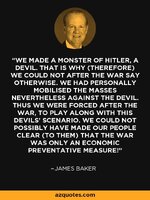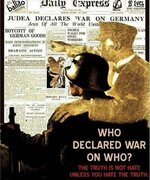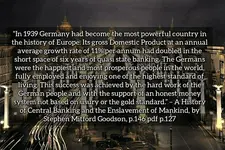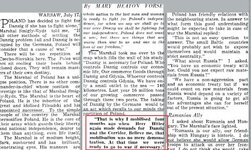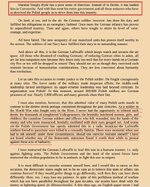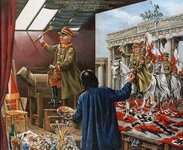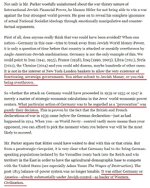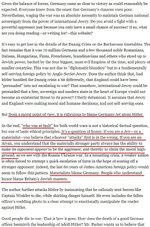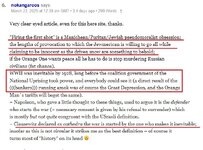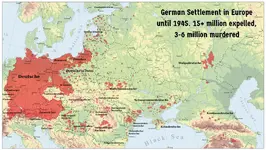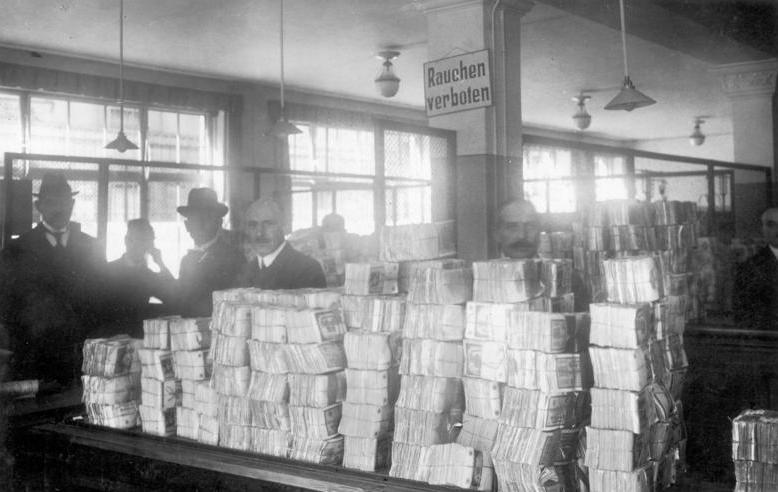Your entire argument rests on the premise that Hitler was able to break out of the constraints of the Treaty of Versailles, but then somehow outside forces managed to reestablish even more stringent controls even though Germany had become economically successful. It makes no sense and there is no reason to believe any of this.
I appreciate your interest in the details. This will be a long one, so read when you have time.
The creation of the Reichsmark and the elimination of the gold standard removed the control of international financiers (like the Rothschilds) which was a fundamental reason why the Allies escalated their economic warfare against Germany. They escalated in tandem with Germany's internal successes to stop German economic success from growing.
Hitler’s economic success from 1933-1939 wasn’t a fluke or an isolated achievement because it was the direct result of both cold-turkey ceasing usury and breaking free from the shackles of the Treaty of Versailles which were specifically designed to cripple Germany permanently.
The Treaty of Versailles wasn’t just a political document but a deliberate system of economic strangulation (Article 231, the War Guilt Clause). Germany’s resurgence under Hitler was a direct challenge to the entrenched international financial system and its decades of predation on Europe. They had the same troubles with Bismarck, the Tsars, and Wilhelm II. If you look specifically at European history in tandem with the spread of Rothschild banking from Napoleon's defeat in 1815, the most compromised cities were London, Paris, Brussels, Frankfurt, Naples, and Vienna (under the degenerating Hapsburgs). The five sons of Mayer Amschel Rothschild specifically went to these hubs. Amschel stayed in Frankfurt, Nathan went to London, James to Paris, Carl to Naples, and Salomon to Vienna. Berlin, Moscow, most of the major hubs between them were not fully controlled by this new jewish economic bulwark until after 1918. The USA for the most part was free of this as well until 1913. Western Europe (British isles, France, Denmark, Belgium) from the time of the French Revolution until WWI was rapidly judaized in its economy.
The reparations alone imposed by the Treaty created an impossible burden, intentionally keeping Germany in a state of financial chaos. After the failure of the second phase of the 1919 revolution when the Bolshevik-led Soviet Council could not take hold in Germany, the western parliamentarians and plutocratic financiers seized control. Instead of a gutting like their eastern counterparts did with the Tsar, they decided to get fat off of the suffering of the Germans while the red menace creeped ever-presently on the east.
Under Hitler instituting the creation of the Reichsmark and the elimination of the gold standard he effectively removed control from international financiers (Rothschilds). This in turn became one of the fundamental reasons why Britain and France escalated their economic warfare against Germany. As Germany’s internal successes grew, the Allies acted swiftly to halt Germany’s economic resurgence with their own pre-emptive escalation in resource denial. All before any war started.
Germany had access to international trade and did not need much oil.
You must consider when they had access and with whom, in addition to when they did not.
Before Versailles Germany had access to vast colonial resources through its overseas empire (German East Africa, South-West Africa, Togoland, Kamerun, and territories in the Pacific like Samoa). These colonies provided raw materials like rubber, palm oil, and metals. Stripped of these holdings after WWI meant Germany became heavily reliant on imports for essential resources. The victors of WWI particularly Britain and France ensured Germany remained dependent on their controlled trade networks.
Versailles also severely restricted Germany’s ability to import key resources throughout the 20s. The military Ruhr occupation by France (1923-1925) was a direct effort to extract German coal and industrial production as "war reparations." The German merchant fleet had also been confiscated which reduced its ability to engage in international trade on its own terms. The intentional hyperinflation crisis of the early 1920s further exacerbated these problems and made it nearly impossible for Germany to secure long-term trade deals.
The Anglo-French economic war against Germany began well before open hostilities. They didn't anticipate the MEFO bills and the labor treasury certificates (LTCs) revitalizing the internal state economy without the additional resources at first.
Germany had the finest coal liquification plants in the world, which produced high grade oil products out of coal. All they needed was coal,
The coal liquefaction / synthetic fuel technology you mention was developed under IG Farben because of Hitler’s economic reforms aimed for autarky, it was an innovation to fill a need given that Germany still lacked key strategic resources, particularly oil, rubber, and certain metals.
However even with German industrialist funds these plants were expensive and inefficient, they could not produce enough fuel for sustaining a country so Hitler secured trade agreements with nations like Romania (for oil in Ploiesti) and Sweden (for iron ore), but these were vulnerable to British and French diplomatic interference so Germany began stockpiling resources in anticipation of external military aggression, in case the same blockade tactics used in WWI would be deployed again (which they were).
However the advanced coal-to-oil process was extremely inefficient for the demands of modern industry. Germany's oil production from coal was only able to meet about 30-40% of the country’s oil needs. The process of Bergius hydrogenation converting coal to oil was not efficient. This immense industrial investment could not be scaled up fast enough to fully replace crude oil. It took 4 tons of coal to produce 1 ton of synthetic fuel. By 1943 Germany produced only 124,000 barrels per day while the Allies had access to millions from Texas, occupied Iran, and the Soviet Union.
The British bombed synthetic fuel plants relentlessly. Operation Tidal Wave (1943) crippled Ploiești oil fields and the Allies targeted plants like Leuna and Politz reducing German output drastically.
which is in mass abundance pretty much everywhere.
The situation with coke was even worse. Germany’s coke production was severely limited when you look at the resource availability of the time. Even with the liquefaction plants the lack of adequate coke for steel production restricted Germany’s ability to build enough defense machinery to compete with the Allies in the long term.
The most productive coal basins in Germany were the Ruhr Valley and Silesia (Upper and Lower). While these regions had significant reserves Germany was highly dependent on these mines and could not easily expand production. The loss of Alsace-Lorraine in 1919 to France meant Germany lost access to critical iron ore and coal resources.
Not all coal was suitable for oil production, only high-quality bituminous coal was efficient for liquefaction into synthetic fuel. Lignite (brown coal), which Germany had in abundance, was lower-grade and inefficient for this purpose.
Britain and France had vast coal reserves (UK’s South Wales, France’s Nord-Pas-de-Calais) and used them freely. Poland’s Upper Silesian coal mines were highly productive, but after 1919, much of this region was lost to Polish control, forcing Germany to reclaim it in 1939.
David Irving goes over all the different type of coke and coal in his books and why these were strangulated since the end of WWI.
In addition, if oil was the primary goal, then why didn't Germany just go for the Bakken oil fields in Russia
The Bakken oil fields are in North Dakota, USA. You must be thinking of Baku, which is in the Caucasus (Azerbaijan) then under occupation by the Soviets. The Wehrmacht did attempt to capture the Caucasus oil fields including Baku as part of
Operation Blau (Case Blue) in 1942.
The full Operation Blau aimed to capture:
-Maikop oil fields (captured Aug. 9, 1942, but heavily sabotaged).
-Grozny oil fields (never fully secured, major fighting August-Dec 1942).
-Baku oil fields (never reached, Germans got 300 miles away).
The Soviet scorched earth tactics ensured that most captured oil fields were useless.
There are different schools of thought on the approach to Moscow versus Baku and which one took more of a preference. Military tacticians still debate this to the present day.
The Soviet railway system was centrally designed with Moscow as the logistical hub, capturing it would have crippled Soviet transportation, supply lines, and command. . The major east-west and north-south railways converged in Moscow, meaning that seizing it would have paralyzed Soviet logistics across the entire European portion of the USSR. Even after the Germans failed to take Moscow in Operation Typhoon (Oct-Dec 1941) Soviet logistics continued to struggle for 3 more years due to the Wehrmacht’s deep penetration into key supply corridors and the superior tactics of the outnumbered Waffen-SS legions.
Since the entire Soviet rail network was centered around Moscow, skipping Moscow and going straight to Baku for most of the generals would have been a logistical disaster because the Wehrmacht needed supply lines through Ukraine and southern Russia. The further south they advanced the more vulnerable they became to Soviet counterattacks. The Stalingrad disaster (Aug 1942 – Feb 1943) showed what happened when disobedient German commanders overextended without securing supply lines, though there could be an entire thread just on Paulus and Stalingrad, there are no simple answers for that.
Logistics in the rapidly changing environment crippled the push southwards along with many other factors (radio interceptions, intelligence leaks, aristocratic officer disobedience). Hitler was not in charge of the Eastern Front as much as many like to think. The Generals are where the meat of this question is.
Several German commanders ignored directives or pursued personal military strategies that deviated from Hitler’s orders which played a crucial role in the logistical failures of Operation Blau.
General Heinz Guderian (Panzer Group 2, Army Group Center) advocated for a direct drive on Moscow in 1941, and argued against diverting forces to the Ukraine as a means of passage to the Caucasus (as ordered by Hitler). He was later dismissed in December 1941 from this command position.
Field Marshal Fedor von Bock (Commander of Army Group Center) wanted an all-out push for Moscow, he was frustrated with Hitler’s decision to send panzer groups to the Ukraine in August 1941 in a continued eastwards push for the oil fields. He was also eventually relieved from command in July 1942 after expressing continued disagreement with Hitler’s orders.
One also has to understand that two Germans having disagreements is much more cordially vitriolic than what you and I have. German military officers can have literal shouting matches full of insults and then go back to talking normally as if it never happened to carry on with their meetings.
Field Marshal Erich von Manstein (11th Army, later Army Group Don) was a brilliant strategist, but clashed with other both Hitler and other generals over how to conduct operations in the south. He argued that Stalingrad should have been bypassed to continue the push toward Baku. After Stalingrad he led the Third Battle of Kharkov (Feb-Mar 1943) temporarily stabilizing the front but failing to regain the strategic initiative for further offensives.
General Franz Halder (Chief of the General Staff of the Army) (OKH) was highly influential and often disagreed with Hitler’s strategic decisions, particularly the focus on the South (Ukraine, the Caucasus, the oil fields) instead of a decisive strike at Moscow. Halder’s views were more aligned with traditional Prussian military doctrine focusing on the need to decisively defeat Soviet forces by taking Moscow as the Soviet political and logistical heart.
Friedrich Paulus (Commander of 6th Army, Stalingrad) was heavily influenced by other high-ranking officers whom were tied to anti-Hitler factions in the Wehrmacht and Abwehr. He was indecisive and overly bureaucratic. He reached Stalingrad's outskirts in August 1942 but delays from attacking, alowing Soviet reinforcements (Chuikov's 62nd Army) to dig in. Instead of treating Stalingrad as a secondary objective to punch through, cut-off enemy access, and move on, he got bogged down in a city fight completely contrary to Germany’s blitzkrieg doctrine.
Manstein's recommendations for all generals and commanders was never to get trapped in urban warfare., and he even advised them to bypass Stalingrand entirely. After the Soviet counteroffensive (Operation Uranus, November 1942) Paulus refused to attempt a breakout of the encirclement even when Field Marshal Erich von Manstein’s relief operation (Operation Winter Storm, December 1942) had a chance of opening a corridor. When Paulus surrendered in February 1943 he defected to the Soviets and became a propaganda tool against Germany. His actions in retrospect potentially cost Germany the entire bid for resources that could have secured them a victory at least in the east, and given how quickly he became an ardent Bolshevik bootlicker, it would almost seem premeditated.
The further south the Wehrmacht advanced the longer and more vulnerable their supply lines became. The road networks in the Soviet Union were primitive, and their railroads had a different gauge than German railroads requiring extensive conversions. Soviet counterattacks on supply lines (Partisan movements and raids by Marshal Rokossovsky’s forces) exacerbated shortages. Operation Edelweiss (July 23, 1942 – Oct 1942) was Germany’s official attempt to seize Maikop, Grozny, and Baku as a sub-operation of Operation Blau.
One debatable criticism in World War Two is whether or not Hitler should have purged or relieved all the German aristocratic generals what Stalin did in 1937 and 1938 to Tuchachevsky and the thousands of other highly-skilled Soviet officers. I wouldn't call Stalin a retard for doing what he did, but it certainly set him back years in doing so. The USSR was ready to invade Europe in the mid 1930s and could have destroyed every continental military (especially the miniscule German military of then 1936) without Lend-Lease but his purges prevented them from doing so.
Resources weren't the primary issue.
Here is a short recap of the oil shortage timeline on Germany's behalf:
-1919 Treaty of Versailles stripped Germany of its colonies and overseas fuel sources as well as much of its domestic coke sources.
-The British-French economic encirclement in the 1920s-30s forced Germany into reliance on domestic coal, synthetic fuel, and limited trade agreements (Romania, Sweden, USSR Molotov-Ribbentrop Pact 1939).
-The British blockade (1939 onward) and American sanctions (1941) cut off all petroleum imports.
-Germany’s pre-war stockpile of oil (2.5 million tons) was rapidly depleting by 1942.
-The failure to fully seize the Maikop oil fields (August 1942) left Germany’s oil needs unmet.
Thus Hitler’s push toward Baku in 1942 and 1943 was a matter of survival not ambition.
Indeed, if resources are scarce, going to war against a naval super power like Britain made even less sense because then you'd be embargo'd.
You keep using the language "going to war against". This is historically backwards. Britain declared war on Germany, not the other way around. Hitler repeatedly sought an understanding with Britain before the war even pledging his own troops to fight for British Imperial causes and they turned him down. The British Empire relied on blockades, embargoes, and financial manipulation as weapons of war long before direct conflict. There is clear and constant antagonism for years towards Germany on behalf of England with France as it's baguette backup. Which type of war provocation (propaganda, economic, kinetic) and what kind of escalating reaction from Germany must be considered in each event.
The German retaliation on Polish-occupied German lands was a territorial correction and not a global war gambit. Britain and France used Poland as an excuse to start their kinetic war even though Poland itself had aggressive expansionist policies against Czechoslovakia and Lithuania, which the British and French never uttered a single peep on. They tried to start the war on Germany a year earlier with the Czechoslovakia events in 1938 and fell utterly silent when Poland took a cut of the carcass for themselves. Even earlier than that starting in late 1937 Sir Frederick Leith-Ross, the British government's chief economics advisor, had plans drafted to revive the World War I-era blockade strategy which aimed to leverage Britain's naval superiority and global commercial network to restrict Germany's access to essential resources.
Why would the English begin making plans for wartime blockade formations a whole two years before any conflict broke out unless they were attempting to engineer a conflict under pretenses?
No strategy, no foresight, and, and no path to victory. None of it makes any sense and neither do your justifications.
Hitler’s actions were rooted in the realization that Germany was facing a dire existential threat from an increasingly hostile world.
The idea that Germany had no path to victory is undermined by the fact that Germany succeeded in rapidly recovering from the devastation of Versailles, outpacing its enemies in economic and military production. All of their military actions were retaliations and not provocations. The strategic goal was clear: secure resources, remove threats, and create a self-sufficient nation outside the reach of British and French blockades, all while confronting the real danger of the Soviet Union, which had expansionist ambitions and was being supported by international bankers who had previously betrayed Germany after the First World War.
The "path to victory" may not have been fully realized due to unforeseen factors, but the decision to fight back wasn’t an irrational outburst it was a response to being cornered by international economic pressures and a geopolitical landscape intentionally hostile to German self-determination. Is national sovereignty illegal?
Germany was always at a resource disadvantage compared to the British and Soviet empires. Hitler's economic policies successfully restored German industry but could not yet fully solve the structural deficiencies caused by Versailles, loss of colonies, and planned economic isolation without leaving the national scene and entering the international. Their growth and eventual fighting back was not a reckless gamble but a concerted attempt to break free from an economic siege that had been imposed since 1919.
The book I posted in an earlier reply is aptly titled "Hitler: Born at Versailles" for these very reasons.
In terms of international trade, in the 1930's, Germany had the trade access through: Italy, Spain, Norway, Sweden, Finland, and Switzerland.
We must consider these all individually before the war and again once Britain and France declared war on Germany.
Italy was an importer of coal, oil, and metals. Italy imported most of its coal (including from Germany) as its domestic production was negligible. Italy had no major domestic oil reserves relying on imports from Romania and the Middle East. They had some iron reserves but they were low quality and insufficient for large-scale steel production. It couldn’t sustain its own industry for a defense economy let alone supply Germany. Italy also lacked effective convoy protection in the Mediterranean, and British naval dominance blocked Italian trade route access to resources from Africa and the Middle East. The British blockade cut off Italy from vital materials especially after France fell in June 1940 and Britain held Malta which a key naval base that strangled Axis supply lines. Italy’s attempts to bypass this with ships were constantly targeted by the Royal Navy and RAF bombers.
Spain was devastated after its civil war (1936–1939) and had no surplus resources, it had no major coal, iron, oil, or rubber reserves that could meaningfully contribute to the German defense effort. It depended on British and American imports for essentials like food and oil, meaning it could not openly support Germany without economic collapse once the war began. The Spanish population was malnourished due to agricultural destruction and disruptions in supply chains from all the "scorched earth" tactics of the reds. The only significant material Germany imported from Spain was tungsten used for hardening steel (for weapons and armor), which they sold to every country.
Despite Hitler sending the Luftwaffe Condor Legion and thousands of German advisers, weapons, and supplies to support Franco’s Nationalists against the Soviet-backed Republicans, they were not in the position to repay him with allegiance against the Allies who they were in trade agreements with, but out of all the neutral countries Spain was the most supportive of Germany, during and to the survivors after the war. Without the earlier German support Franco would not have been victorious meaning there would have been no neutral Spain to even consider helping Germany later.
Sweden supplied iron ore to Germany but this was dependent on Norwegian ports (Narvik) which the British planned to cut off access to in early 1940 (Operation Wilfred & Plan R 4) to stop German access to Swedish iron. Sweden's own ports were always frozen in winter time.
Norway itself was not a major resource provider yet, which is why the pre-emptive German occupation went here first to secure its shipping lanes. The British would have rendered Germany's defense effort obsolete had they been able to set up in Scandinavia, Britain was already attempting to cut off Swedish iron ore shipments through naval actions in 1939–1940. The British Royal Navy mined Norwegian and Danish waters in April 1940 (Operation Wilfred), cutting off northern trade routes. Germany reacted by launching Operation Weserubung (April 9, 1940), seizing Norway and Denmark to secure Narvik and protect ore shipments. The British landed in Norway attempting to carry out Wilfred but were defeated and withdrew by June 1940.
Finland was engaged in its own war with the USSR (Winter War, Nov 1939 – Mar 1940, and again 1941 until 1944). It lacked the industry or trade routes to supply Germany. Finland itself had to import war materials, relying on Sweden for weapons and food. Finland was not an industrial powerhouse, it lacked major coal or oil reserves. The country’s primary exports were nickel, timber, and some metal ores (like copper and zinc) and were not enough to sustain a wartime economy of a foreign nation let alone themselves.
Finland’s most valuable resource to Germany was nickel, which was crucial for high-grade steel production. The Petsamo nickel mines in northern Finland were originally developed with British and Canadian investment, and in 1940 Britain pressured Finland to limit exports to Germany. Germany only secured full access to Finnish nickel after Finland joined the war against the USSR in 1941 with Barbarossa.
Switzerland has been a neutral banking hub since Napoleon and not a major resource provider. Swiss industrial output was mostly focused on precision instruments, chemicals, and pharmaceuticals which were not significant for sustaining any defense economy. Switzerland depended on external trade routes which the Allies controlled.
So even if Germany was sanctioned, they still had pathways through other countries to avoid it. Would it have made things a bit pricy for Germany? Still cheaper than WW2.
Except the Allies, primarily Britain, were systematically sabotaging or closing those pathways. When the British cut off these routes they were making economic war inevitable, and in the phases of warfare, this always precedes the kinetic.
-Britain immediately enforced a total blockade of German shipping in 1939 meaning even neutral countries faced immense pressure to halt or restrict trade with Germany.
-Britain mined Norwegian waters (April 1940) to prevent Swedish iron ore from reaching Germany. They were making aggressive moves towards Norway and if Germany had not intervened they would have occupied it themselves.
-Italy relied on imports from British-controlled colonies (Egypt, India) for oil, making it impossible to sustain German trade.
-Spain was economically hamstringed because of its dependence on American oil shipments, by it declaring itself neutral in a then European-only conflict, it was still able to receive the oil from its American contracts which was in effect helping it sustain itself after its costly war just ended.
Another war against Germany was designed to happen no mater what Germany did. The war plans were drawn up years in advance in England. They had conditions in place from 1919 onwards to economically militarily prevent German recovery to the pre-Weimar state, they did not count on the maneuvering of alliances and the changing of loyalties (Italy was Allied in WWI, most of what went wrong with English strategy in preventing early German recovery was not accounting for this switch, along with Spain becoming neutral after their war against the reds). They had failed to contain Germany against the collar they put on it in 1919 and to them it had to be "put down."
In terms of oil; instead of going to war, imagine if Hitler had explored for oil among his allies? Norway was sitting on a massive deposit that no one had any idea existed back then.
Yes the first significant oil discoveries in Norway happened in 1969 (Ekofisk field). No one, not Germany, Britain, the US or the USSR had any idea of these reserves at the time.
The offshore drilling technology in the 1930s was primitive and only used in shallow waters near land. Germany had neither the time nor the resources to develop deep-sea drilling under wartime conditions. The real issue for Germany was not just drilling for oil but refining it. Oil refineries, transport infrastructure, and the means to extract oil efficiently were just as critical, if not more, than the drilling process itself. While Germany could have potentially engaged in exploratory drilling it was far more practical given their limited resources to secure existing oil sources in the Balkans and the Caucasus which had functioning infrastructure.
Even if Germany had somehow managed to build one of these shallow-water platforms moving the oil from the platform to the mainland would have required a functioning logistical system. This system would include transport via tankers, pipelines, and other means which were blocked or threatened by the British Royal Navy’s control over the Mediterranean, North Sea, and Atlantic shipping routes.
Romania was one of Germany's most important allies in terms of resources. They had Europe’s largest oil reserves specifically in the Ploiesti oil fields which provided about 30-40% of Germany’s oil throughout much of the war. Germany and Romania signed economic agreements in the 1930s where Romania began to supply Germany with oil, wheat, iron, grain, among other materials.
After the Soviet occupation of Bessarabia in June 1940 which was then part of Romania, it joined the Axis powers in November 1940 under the leadership of Ion Antonescu a close ally of Hitler. Romania contributed over 200,000 soldiers to Barbarossa. The Romanian 3rd and 4th Armies participated heavily in the siege of Odessa and fought along the southern front in Ukraine and the Caucasus.
By 194, Ploiesti was vital to Germany’s military operations and Romania’s oil was the cornerstone of Germany’s fuel supply. Without it the German military would have collapsed under the strain of prolonged conflict much sooner. German forces secured Romanian oil fields, creating fortifications around Ploiesti to prevent Soviet raids.
The British bombed Ploiesti oil fields (June 1941) before 1943 the Allies launched multiple bombing raids on the them trying to cripple Germany's fuel supply. The most famous raid was Operation Tidal Wave (August 1, 1943) where US bombers attempted to totally destroy the oil refineries. That raid caused significant damage but failed to completely halt oil production.
Britain and its allies also completely controlled Persian Gulf oil (Iraq, Iran, Saudi Arabia) preventing Germany from accessing any major alternative supplies. They had bombed Afghanistan, Iraq, and invaded Iran jointly with the USSR in 1941 to force them from their pro-Axis stances (they even forced them to kick out, or arrest all people of German descent).
The idea there were no alternatives for Germany except war just isn't true.
This ignores the fact that Britain and France had
thousands of alternatives to warmongering and encircling Germany, which is absolutely true.
They could have chosen peace, such as not supporting Versailles, but something malignant, deep-rooted in their geopolitical agenda drove them to relentlessly pursue Germany's destruction regardless of the cost even to their own nations. For them Germany had to either accept eternal enslavement under the impossible terms of Versailles or not exist at all. That was their goal.
What you don't seem to grasp is the sheer bloodlust and warmongering of the Allies. Germany had no other choice but to fight back. The Allies were willing to sacrifice everything to stop their neighbor from standing on its own two feet. The masonic elites in Britain and France, especially the British Empire and their jewish financial backers were the primary stokers of this aggression. From 1936 onward the British Empire through its press and political establishment was already agitating for war.
The British government began mobilizing for war as early as 1938 long before the Polish situation. Even before that Britain’s use of the naval blockade against Germany which started in 1914 continued to choke Germany’s trade routes making self-sufficiency a pipe dream. The “War Party” in Britain including figures like Winston Churchill and many in Parliament had already made it clear that war was their preferred method of curbing Germany’s resurgence. They made it clear that they were willing to go to war to prevent Germany from reclaiming its lost sovereignty and addressing the injustices imposed by the Treaty of Versailles.
The British refused all German peace offers in 1939–1940 even when Germany offered to withdraw from Poland completely. Why would they refuse that when "German presence in Poland" is supposedly their casus belli? Poland had invaded Lithuania (1920) and Czechoslovakia (1938) but Britain and France did nothing which proves they didn’t care about "aggression" only about stopping Germany. Everything they did reveals this pathological German hatred.
No one wanted war except the elites and their jewish financiers. The British people on a whole didn't agree with declaring war on Germany. Oswald Mosley’s British Union of Fascists (the BUF) opposed all war but the British government arrested and jailed all of them, thousands of people, once they declared war to silence all the anti-war sentiment which was louder than anything in parliament. The America First movement in the US opposed war but Roosevelt systematically sabotaged and undermined neutrality through multiple vectors including Lend-Lease, and campaigned a third time on the biggest lie a president ever made dragging America into conflict against the will of the people.
Everything Germany did was a reaction not a provocation. It goes against 80+ years of their narrative, but all the other Hitler arguments aside, the truth is that the entirety of both wars (WW1 and WW2) were international finance's agenda to prevent an independent power from rising up on the European continent that would challenge their rule. The two biggest threats to this were the Tsars and the Kaisers. Hitler was not a Kaiser, but his inertia was going to be the death knell of the anglo-jewish banking system because the cat was out of the bag then. It was conveniently stuffed back in to the public after 1945 and few ever debate this war from an economic point of view because then the rats are all exposed.
Germany's actions were always reactive, never provocatory. The 80-year ongoing narrative of German aggression is a convenient cover-up of the true motives behind both World Wars: international finance's desire to prevent an independent power from rising in Europe that could challenge their control. The two biggest threats to their global dominance were the Tsars and the Kaisers, and in Hitler, they saw the resurgence of that threat. National Socialism's inertia was going to be the death knell of the talmudic banking system. The cat was out of the bag. His rise wasn’t about expansionism or any of the hollyweird fantasies. It was about economic independence and that was the real reason behind the Allied aggression. By 1945 the true story was buried and few ever dare to examine this war from an economic perspective because doing so exposes the jewish agenda as plain as day.

